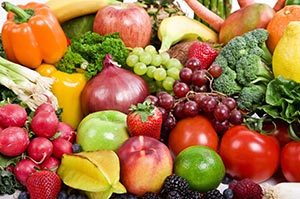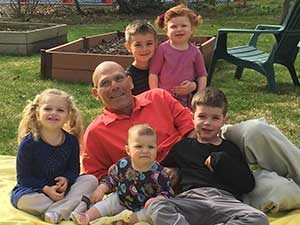(Editor’s Note: As the University administration seeks to protect its budget and reduce expenses in light of the COVID-19 pandemic, Michigan Today has been asked to temporarily suspend its freelance budget. This affects our talented and much-loved columnists, like Vic, who are going on hiatus for now. This editor learned so much from Vic over the years. I hope you did too. Vic’s columns are archived under ‘Columns.’)
You can do it!
I started writing Health Yourself eight years ago. From the beginning, I have made it my goal to present the latest science-based research about taking responsibility for our personal wellness. For each of my 80 columns, I’ve tried to present questions we need to consider and actions we need to take to control our wellness destiny, to become a Wellness Champion. Each decision we make has consequences that drive us toward illness or wellness.
As I discussed in my first column on March 12, 2012, positive wellness represents more than just the absence of disease or specific pathology. It goes far beyond just adding years to our life or avoiding physical and mental health problems. For me, wellness refers to optimal vitality — the capacity to live life to its fullest. It encompasses all of our experiences, including joy and contentment, combined with a sense that one’s life is good, meaningful, and worthwhile.
People who are well pursue new understandings, seek novel achievements, and direct their conscious decisions to control factors that promote vitality, joy, and healthy longevity. To be well, we have to make wise decisions about all the actions we take in our physical, emotional, intellectual, interpersonal, environmental, and spiritual lives.
Learn, analyze, practice
 To achieve optimal wellness, we need to learn, analyze, and practice new behaviors and attitudes to live life to the fullest.
To achieve optimal wellness, we need to learn, analyze, and practice new behaviors and attitudes to live life to the fullest.
It’s hard work to “health ourselves.” It’s a process that takes time to master. But it’s worth it. It nurtures a life worth living, even in the face of ill health that may come our way.
It’s human nature to want to snap our fingers and see results without putting in the hard work. It is very simple to conserve energy, avoid pain, blame others for our shortcomings, defer and deflect from facing reality, or plead ignorance of knowing the right thing to do. These shortcomings interfere with our ability to take positive actions to “health ourselves.” We rarely believe what we do will cause our death — until it happens, of course. We need to stay clear of all the “soul helpers,” “testimonial gurus,” and “pseudoscience experts” who dismiss legitimate science and play on our vulnerabilities. So often they offer all-too-simple solutions to incredibly complex problems. There is no shortcut to achieve optimal health. Change is challenging.
In my articles I’ve tried to present the scientific facts, not opinion, about how to achieve optimal health in the six wellness dimensions. It always has been my view that once we know the facts, we are better able to analyze and consider what actions to take to optimize our wellness. We have to be persistent, resilient, and enthusiastic, seeking out techniques that work and rejecting those that don’t. Each individual will have their own experience. But each of us knows when we’ve made a positive investment in our “wellness portfolio.” That’s the key: Keep trying to take positive, (often) baby steps to become a Wellness Champion.
My four key ingredients to optimum wellness
As I’ve tried to navigate my own wellness voyage, I’ve discovered through study, analysis, and practice some necessary ingredients to become a Wellness Champion. So, here’s my recipe.
- Move more, sit less
Become a mover, not a sitter. As I discussed in one column, cumulative research evidence from around the world suggests it is total sedentary time per day that closely associates with health risk. Too much sedentary behavior results in increased health risk and decreased wellness. We should all get up and move more. Never sit for more than 30 minutes without getting up and moving for at least a few minutes. Do something! Be more active! - Eat healthy — mostly plants
 Food has two main purposes: to provide our body with necessary nutrients and to provide joy and pleasure. Nourishing our bodies and experiencing joy and pleasure are not mutually exclusive. I’ve dedicated many columns to what it means to eat well. But all the noise, misinformation, and misdirection has left us confused and bewildered about what to eat. Eating has become complicated. It shouldn’t have to be. As I have written about on many occasions, healthy eating includes the following three principles:
Food has two main purposes: to provide our body with necessary nutrients and to provide joy and pleasure. Nourishing our bodies and experiencing joy and pleasure are not mutually exclusive. I’ve dedicated many columns to what it means to eat well. But all the noise, misinformation, and misdirection has left us confused and bewildered about what to eat. Eating has become complicated. It shouldn’t have to be. As I have written about on many occasions, healthy eating includes the following three principles:
- Eat a variety of different whole, fresh foods that are nutrient-rich (dense) relative to their caloric value. These foods (mostly from the plant world) contain an abundance of vitamins, minerals, fiber, phytochemicals, and other essential nutrients. If you eat meat, make it a side-dish. Eat a minimum of processed and packaged foods that are calorie-rich but nutritionally deficient.
- Reduce your intake of added sugars and foods high in cholesterol. Limit alcohol and salt intake.
- Practice moderation. Healthy eaters know when to push away from the table. They develop coping skills to avoid overeating — and they listen to their bodies.
- Avoid the negative; promote the positive
More than 2,000 years ago, the great Indian (Buddhist) philosophers postulated that negative emotions lead to personal suffering, physical and mental sickness, and sadness and unhappiness. These negative emotions include hatred, anger (and its siblings vengeance, rage, and spite), vindictiveness, jealousy, inflated pride, attachment and desire, and inflated superiority that leads to disrespecting others. Research confirms that people who do not learn to control their negative emotions are more prone to mental afflictions and inflammatory processes that promote chronic diseases. The positive psychology field has taught us we still have a lot to learn about how positive emotions translate to enhanced biologic function that leads to enhanced wellness. Those destined to become Wellness Champions will learn to embrace and practice positive emotions: a sense of propriety and self-respect, considerateness and equanimity towards others, conscientiousness to avoid negative acts, nonviolence and compassion toward self and others, and, of course, enthusiasm and joyous effort to act positively in everything we do.  Control your Mind
Control your Mind
The ability to control our emotions and actions is complicated. Some people seem better able to do it than others. It seems to me, that those who are more self-reflective, who try to understand why they behave the way they do, and who try to learn from the great thinkers are best able to control their emotions. Learning and practicing how to be self-discerning, to understand the self and one’s reality opens the gateway to enhanced wellness and happiness. For many, meditation practices afford an accessible method for mastering the mind.
That’s it: My recipe for how to become a Wellness Champion. I work at it every day. I can only hope that by the time I reach age 100 I’ll get it right!
Farewell for now
While this may be my last official Health Yourself column (for now), I hope to continue to contribute to Michigan Today as a guest columnist in the future. I’ve enjoyed our years together and hearing and learning from many of you.
I want to thank editor Deborah Holdship for the privilege of allowing me to be part of Michigan Today. Deborah afforded me the opportunity to discuss nearly any topic I wanted, without constraints. She has been supportive since she signed on as editor and is a delight to work with. I am proud to call her my friend.
If you would like to communicate, feel free to email me at vkass@umich.edu.
Go Blue!




Glenn Marshall - 1955E
Thank you for providing years of sound advice. My health is better for it.
Reply
Robert Krasny - faculty
Thank you Vic. I always looked forward to your columns.
A few ideas for Michigan Today to consider:
1. The need to focus our financial resources on the most urgent priorities is clear. However It seems likely that among Covid-19 patients, those who are “more well” require less expensive medical care and have better outcomes – and Vic’s message – enhancing wellness through exercise, nutrition, weight control, etc. – could be considered a cost-saving and life-saving measure worthy of continued funding. His message is even more important at this time.
2. Since Vic’s columns are timeless, publish his classics until circumstances permit him to resume writing new ones.
3. Start an endowment fund to support the columnists.
Reply
Gary Schneider
Thank you, Dr. Katch, for the valuable information and insights you’ve provided all of us over the years. You’ve been a delight to read. All the best.
Reply
Carl Billings - 1967
Excellent article, Vic. Thanks!
Reply
Ellen O’Brien
Dr. Katch—I always love reading your articles. Thank you for your years of contributions. Wellness is always the dream, and I have always found your writing refreshing and inspiring. Thank you!
Reply
John Harvey - 1997 MSEME
Thank you for the excellent information. As an engineer, reading your timely science of health has been welcome. Agreed that your column is needed more than ever now. Thanks!
Reply
Thomas Cislo - 1972, 1975
Victor,
Thanks for sharing your knowledge, insight and expertise on health. I have sought out and read your Michigan Today column Health Yourself for many years. Excellent. I hope there is a way we can read more from you in the future.
Reply
Bonnie Paine - 1963BS, 1967MBA
Thank you for the information I needed. You have propelled me to health.
Reply
THOMAS TEMPLIN - 1978 PhD
Dr. Katch,
When I attended my first doctoral class at the U of M in the fall of 1974 with a young asssitant professor named Vic Katch, I knew it would be a good ride. Your many contributions to Health Yourself over the year as well as the field of Kinesiology has proven what a special professor and health advocate you have been. This article reinforces your expertise and wisdom. Thank you!
Be well, my friend.
Reply